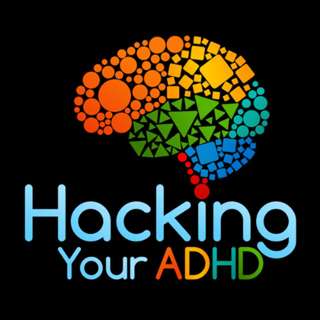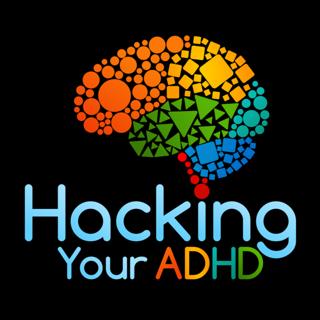
How to Handle Low Capacity Days (Rebroadcast)
One of the ideas that I was presented with during the pandemic was that of surge capacity - this is the idea that we all have reserves of emotional energy that we can call on when we’re in a crisis situation. And this was an important idea for people to grasp as the pandemic wore on because people were finding themselves depleted. Despite having been able to handle everything they eventually came to a wall where they didn’t have any more to give. This is an important concept, but not specifically what I want to talk about today because what I want to talk about is what I gleaned from this idea. That we because we have surge capacity, we also have a normal capacity. This seems like a fairly obvious point, but also one I think that a lot of us with ADHD often overlook. Despite everything I know about planning it is still far too easy for me to try and squeeze too much into one day. And this isn’t just in terms of how much time I have or how much energy I have, but just how much I can reasonably take on. In today’s episode, we’re going to be exploring this idea of capacity and how it can impact our ability to get anything done. We be looking at what we can do on these days and how we can actually use them to help ourselves to recover. Feel free to ask me a question on my Contact Page or Support me on Patreon Find the show note at HackingYourADHD.com/LowCapacity This Episode’s Top Tips We can hit low capacity when we’ve been pushing too hard for too long. Our capacity differs from our energy levels in that we can think of it as the total amount of energy we have for a day. Having a low capacity means that we’re not recovering and that when we do recover we’re only coming back to a low base rate of energy. When we’re at low capacity we need to slow down and focus on the things we can do - this means prioritizing and thinking about ways we can apply “both-and” thinking where we accept reality and how we can function within it. A great way to help build back up our capacity is creating some accountability around our self-care tasks so that we actually follow through with those intentions.
27 Mars 202318min

The Joy of Saying No with Natalie Lue
Hey team, this week I’m talking with Natalie Lue about her book, The Joy of Saying No. Natalie is the author of the popular relationship and self-esteem blog Baggage Reclaim, as well as the host of The Baggage Reclaim Sessions podcast. With ADHD, we can often end up as people-pleasers, always putting other people’s needs above our own. And while being helpful is a great trait, we also need to make sure that we’re taking time for ourselves as well. In our conversation today, Natalie and I discuss how to get out of people pleasing and work on setting up boundaries to help keep us on track with what we really want to be doing. Support me on Patreon Feel free to ask me a question on my Contact Page Find the full show note at HackingYourADHD.com/136 This Episode's Top Tips People pleasing is about suppressing one's needs, desires, expectations, feelings, and opinions to prioritize others' needs and avoid negative consequences. By people pleasing, we create unspoken contracts, and this can lead to frustration when the other party does not fulfill their end. We are often dropping hints instead of being direct about our needs because of our fear of rejection or negative consequences. While it can be hard to say no, it is vital that we are using our no to help us set boundaries that will help us curtail our people-pleasing and allow to prioritize our own well-being.
20 Mars 202350min

Using Our Tools
Hey team, this week we’re going to be talking about using our tools but, more specifically, getting back into the habit after we’ve stopped using them. ADHD has the tendency to make us consistently inconsistent, and that can lead us to finding ourselves having dropped habits, routines, and tactics that had been helping us. Sometimes we need to find new habits, but sometimes we need to look back and figure out why we stopped doing all those things that were helping us get through the day. Support me on Patreon Feel free to ask me a question on my Contact Page Find the full show note at HackingYourADHD.com/135 This Episode's Top Tips There are a lot of reasons that we might stop using a particular tool, from boredom to forgetfulness to changes in our life circumstances. It’s okay for us to change how we’re using our tools, but it’s also important that we’re making that decision consciously. One of the best ways to make sure we’re not losing track of our tools is to create an ADHD toolbox where we’re keeping track of all the tools that we find helpful in our lives. When we’re looking to reinstate some of our previous tools, it can be important to look back and figure out what caused us to stop using them in the first place; however, when we’re doing this, it’s important that we stay out of judgment and approach the question with curiosity.
13 Mars 202317min

Cleaning, Organizing, and Decluttering w/Roxie Martin
Hey team, this week I’m talking with one of my favorite people Roxie Martin - I got to know Roxie back when I was doing ADDmin work for the ADHD reWired Coaching and Accountability groups. Since then we’ve become fast friends and frequently check in with each other. Recently we were talking about Roxie’s decluttering coaching, and I thought this would be an excellent topic for the show because cleaning and decluttering are things that just always seem to come up. In this episode, we talk about the difference between cleaning, decluttering, and organizing - we get into the specifics of how we can be more effective in our cleaning, how we can better approach declutting, and a whole lot more. Support me on Patreon Feel free to ask me a question on my Contact Page Find the full show note at HackingYourADHD.com/134 Be sure to check out https://www.roxiemartincoaching.com/
6 Mars 202336min

Daylight Saving & Circadian Rhythms
Hey team, this week we’re going to be talking about the upcoming change to Daylight Saving Time in the US - but don’t worry, if you’re not one of those places that experience a spring time-switch, there is still going to be a lot of great stuff we cover in this episode. Our natural sleeping and wake times are controlled by our circadian rhythm, so we’re going to be discussing that in some detail and what we can do to help get ready for the time change so that it doesn’t hit us like a ton of bricks. Support me on Patreon Feel free to ask me a question on my Contact Page Find the full show note at HackingYourADHD.com/133 This Episode's Top Tips When we’re preparing for an upcoming time change, we can start moving our wake and sleep times gradually to match up with the change. While it can be tough to adjust our bedtime if we focus on setting a strong bedtime routine, we can use that help us get sleepy and work on adjusting when we’re starting to get ready for bed instead of just when we want to fall asleep. Our circadian rhythm dictates our sleep cycle and energy throughout the day - we can influence it with things like morning sunlight, exercise, when we’re eating, and in some cases, melatonin.
27 Feb 202318min

Burnout and Boundaries w/Skye Rapson
Hey team - this week I’m bringing you a conversation I had with Skye Rapson about burnout and boundaries. Skye is the founder of Unconventional Organization - a New Zealand-based coaching group that specializes in online coaching. They focus on providing research-backed and strengths-based ADHD support to help you get unstuck in your life. You may remember Skye from a previous episode last year, but we had such a fun conversation then that we decided to have another round. In this discussion, we drill into what burnout is, how to work on getting out of burnout, and then also how setting boundaries can help us stay out of burnout in the first place. And really, this is a fantastic episode to help capstone this series on slowing down. Support me on Patreon Feel free to ask me a question on my Contact Page Find the full show note at HackingYourADHD.com/132 Be sure to check out https://www.unconventionalorganisation.com
20 Feb 202342min

Slowing Down: Activation Energy
Hey team, we’re back at it for another episode about slowing down, but this time we’re looking at activation energy, which is the idea we’re going to need to have a certain amount of energy available to get started on a task. When we’re getting ready to get to the next thing on our to-do list, sometimes it can feel like it’s just too much, and getting started is really going to be the hardest part. Activation energy is that minimum threshold for us to get going on that thing, and some days it just isn’t there, and so today, we’re going to be looking at ways that we make getting started a little bit easier. Support me on Patreon Feel free to ask me a question on my Contact Page Find the full show note at HackingYourADHD.com/131 This Episode's Top Tips Activation energy is what takes us from thinking about doing something to actually doing it. It’s what can keep us on the couch when we feel like we could be doing something else. When we rely on urgency being our primary mode of motivation it can make it increasingly hard to work on anything that isn’t urgent. Different tasks take different amounts of energy to activate on and we can work on lower that barrier to entry or increasing our amount of available energy. We can do this by making tasks more fun, using accountability, and breaking our tasks into smaller parts.
13 Feb 202316min

Slowing Down: Task Management (Memory)
Hey team, this week we’re going to keep up our discussion of slowing down, but we’re going to be focusing on memory - well, kind of. With ADHD, it can be hard for us to remember all of the things that we need to do, so what comes into play is the good old to-do list. Because when we’re talking about memory, what we’re really talking about in this context is task management. How we’re going to remember the things we want to do and how we’re going to go about doing those things. Support me on Patreon Feel free to ask me a question on my Contact Page Find the full show note at HackingYourADHD.com/130 This Episode's Top Tips To-do lists serve as a way for us to externalize our memory - we don’t have to mentally keep track of all the things we write down. But if we don’t properly use and curate our lists, they stop being a trusted source of information. We can use our to-do lists to help plan our days, but if we find ourselves constantly not finishing our daily plans, that is a sign that we need to cut back on how much we’re trying to accomplish in a single day. Part of slowing down is accepting that we don’t have to do it all. To help keep our to-do lists from becoming overwhelming, it is important we’re saying no more. One of the most important people we need to say to no more, however, is ourselves.
6 Feb 202317min





















